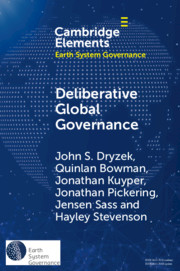Element contents
Deliberative Global Governance
Published online by Cambridge University Press: 08 July 2019
Summary
- Type
- Element
- Information
- Online ISBN: 9781108762922Publisher: Cambridge University PressPrint publication: 11 July 2019
References
- 27
- Cited by



